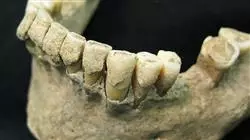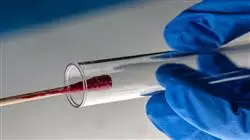University certificate
Scientific endorser

The world's largest faculty of nursing”
Introduction to the Program
Improve your knowledge in Forensic Psychology and Anthropology for Nursing through this program, where you will find the best didactic material with real clinical cases. Learn here about the latest advances in the specialty to be able to provide quality medical care"

This Postgraduate diploma allows to unite the scientific application with the practical part already practiced, adding at the same time an adaptation to new technologies with the implementation of online education.
It allows the student to learn the basic principles necessary for the study of forensic thanatology, forensic pathology, forensic sexology, forensic toxicology, forensic psychiatry, damage assessment, anthropology, and criminalistics.
The Postgraduate diploma covers the needs of professionals who demand adequate knowledge that allows them to perform forensic assessments, expert reports, as well as the ability and fluency to ratify the opinion and understand the phases of the judicial procedure when necessary.
At the same time, it offers the possibility for all students to learn how to assess not only bodily injury, but also to quantify negligence, assess disability, and determine disabilities.
Currently, law firms and private clients require a forensic expert examination for most of their procedures. It is for this reason, added to the null offer of existing professionals, that it is considered appropriate to implement a correct, current and especially useful syllabus for the daily practice of this activity.
The Postgraduate diploma is divided into specific blocks that also coincide with the syllabus given for access to forensic doctor positions offered by the Ministry of Justice, which highlights the quality of the content and comprehensiveness of the same.
Improve your knowledge through the program in Forensic Psychology and Anthropology for Nursing, in a practical way and adapted to your needs"
This Postgraduate diploma in Forensic Psychology and Anthropology for Nursing ontains the most complete and up-to-date scientific program on the market. The most important features include:
- Development of more than 75 clinical cases presented by experts in Forensic Psychology and Anthropology for Nursing
- Its graphic, schematic and practical contents provide scientific and assistance information on those disciplines essential for the professional practice
- New diagnostic-therapeutic developments on assessment, diagnosis and intervention in Forensic Psychology and Anthropology for Nursing
- It contains practical exercises where the self-assessment process can be carried out to improve learning
- An algorithm-based interactive learning system for decision-making in the clinical situations presented throughout the course
- With special emphasis on evidence-based medicine and research methodologies in Forensic Psychology and Anthropology for Nursing
- All of this will be complemented by theoretical lessons, questions to the expert, debate forums on controversial topics, and individual reflection assignments
- Content that is accessible from any fixed or portable device with an Internet connection
This program is the best investment you can make in the selection of a professional program for two reasons: in addition to upgrading your knowledge in FForensic Psychology and Anthropology for Nursing, you will obtain a diploma from TECH Global University"
It includes in its teaching staff professionals belonging to the field of Forensic Psychology and Anthropology for Nursing, who pour into this program the experience of their work, in addition to recognized specialists belonging to scientific societies of reference.
The multimedia content, developed with the latest educational technology, will provide the professional with situated and contextual learning, i.e., a simulated environment that will provide an immersive educational program designed to prepare in real situations.
This program is designed around Problem-Based Learning, whereby the medical must try to solve the different professional practice situations that arise throughout the course of the program. To do so, the physician will be assisted by an innovative interactive video system developed by recognized experts in the field of Forensic Psychology and Anthropology for Nursing and with extensive teaching experience.
Increase your confidence in decision making by updating your knowledge through this program"

Don't miss the opportunity to improve your knowledge in Forensic Psychology and Anthropology for Nursing to improve patient care"
Why study at TECH?
TECH is the world’s largest online university. With an impressive catalog of more than 14,000 university programs available in 11 languages, it is positioned as a leader in employability, with a 99% job placement rate. In addition, it relies on an enormous faculty of more than 6,000 professors of the highest international renown.

Study at the world's largest online university and guarantee your professional success. The future starts at TECH”
The world’s best online university according to FORBES
The prestigious Forbes magazine, specialized in business and finance, has highlighted TECH as “the world's best online university” This is what they have recently stated in an article in their digital edition in which they echo the success story of this institution, “thanks to the academic offer it provides, the selection of its teaching staff, and an innovative learning method aimed at educating the professionals of the future”
A revolutionary study method, a cutting-edge faculty and a practical focus: the key to TECH's success.
The most complete study plans on the university scene
TECH offers the most complete study plans on the university scene, with syllabuses that cover fundamental concepts and, at the same time, the main scientific advances in their specific scientific areas. In addition, these programs are continuously being updated to guarantee students the academic vanguard and the most in-demand professional skills. In this way, the university's qualifications provide its graduates with a significant advantage to propel their careers to success.
TECH offers the most comprehensive and intensive study plans on the current university scene.
A world-class teaching staff
TECH's teaching staff is made up of more than 6,000 professors with the highest international recognition. Professors, researchers and top executives of multinational companies, including Isaiah Covington, performance coach of the Boston Celtics; Magda Romanska, principal investigator at Harvard MetaLAB; Ignacio Wistumba, chairman of the department of translational molecular pathology at MD Anderson Cancer Center; and D.W. Pine, creative director of TIME magazine, among others.
Internationally renowned experts, specialized in different branches of Health, Technology, Communication and Business, form part of the TECH faculty.
A unique learning method
TECH is the first university to use Relearning in all its programs. It is the best online learning methodology, accredited with international teaching quality certifications, provided by prestigious educational agencies. In addition, this disruptive educational model is complemented with the “Case Method”, thereby setting up a unique online teaching strategy. Innovative teaching resources are also implemented, including detailed videos, infographics and interactive summaries.
TECH combines Relearning and the Case Method in all its university programs to guarantee excellent theoretical and practical learning, studying whenever and wherever you want.
The world's largest online university
TECH is the world’s largest online university. We are the largest educational institution, with the best and widest online educational catalog, one hundred percent online and covering the vast majority of areas of knowledge. We offer a large selection of our own degrees and accredited online undergraduate and postgraduate degrees. In total, more than 14,000 university degrees, in eleven different languages, make us the largest educational largest in the world.
TECH has the world's most extensive catalog of academic and official programs, available in more than 11 languages.
Google Premier Partner
The American technology giant has awarded TECH the Google Google Premier Partner badge. This award, which is only available to 3% of the world's companies, highlights the efficient, flexible and tailored experience that this university provides to students. The recognition as a Google Premier Partner not only accredits the maximum rigor, performance and investment in TECH's digital infrastructures, but also places this university as one of the world's leading technology companies.
Google has positioned TECH in the top 3% of the world's most important technology companies by awarding it its Google Premier Partner badge.
The official online university of the NBA
TECH is the official online university of the NBA. Thanks to our agreement with the biggest league in basketball, we offer our students exclusive university programs, as well as a wide variety of educational resources focused on the business of the league and other areas of the sports industry. Each program is made up of a uniquely designed syllabus and features exceptional guest hosts: professionals with a distinguished sports background who will offer their expertise on the most relevant topics.
TECH has been selected by the NBA, the world's top basketball league, as its official online university.
The top-rated university by its students
Students have positioned TECH as the world's top-rated university on the main review websites, with a highest rating of 4.9 out of 5, obtained from more than 1,000 reviews. These results consolidate TECH as the benchmark university institution at an international level, reflecting the excellence and positive impact of its educational model.” reflecting the excellence and positive impact of its educational model.”
TECH is the world’s top-rated university by its students.
Leaders in employability
TECH has managed to become the leading university in employability. 99% of its students obtain jobs in the academic field they have studied, within one year of completing any of the university's programs. A similar number achieve immediate career enhancement. All this thanks to a study methodology that bases its effectiveness on the acquisition of practical skills, which are absolutely necessary for professional development.
99% of TECH graduates find a job within a year of completing their studies.
Postgraduate Diploma in Anthropology and Forensic Psychology for Nursing
Forensic science is a diverse and multidisciplinary field. In this field, the participation of different specialized professionals allows an optimal handling of corpses for the resolution of cases in which it is necessary to determine the causality and culpability of the events and subjects involved in them. Despite the fact that Legal and Forensic Nursing is a well-known Specialization, in recent years the demand for specialized medical personnel to attend and assist this discipline has increased significantly. For this reason, TECH Global University developed the Postgraduate Diploma in Anthropology and Forensic Psychology for Nursing, which aims to update knowledge and promote work strategies based on the comprehensive approach of the expert witness in those professionals who are interested in this branch of science.
Become a forensic expert Postgraduate Diploma
If one of your objectives as a Nursing professional is to contribute to forensic investigation and the judicial system, this program is for you. You will learn the basic principles necessary for the study of various areas of this discipline, such as thanatology, pathology, sexology, toxicology and forensic psychiatry. You will also be able to identify any type of sexual injury and be able to perform in-depth analysis of the phases and cadaveric phenomena. You will also have at your disposal an updated and specific agenda that will allow you to train you for forensic assessments, expert reports and the ratification of the opinion in the different phases of the judicial procedure.
Get your program in the world's largest digital university
At TECH Global University we provide you with the most updated academic content in the market. With this Postgraduate Diploma you will strengthen your knowledge and develop skills for scientific research and forensic valuations. In addition, because it is a highly self-manageable program, you will be able to study completely remotely and manage time and space according to your needs. Get your program now and turn your knowledge into effective skills that will boost your career growth.







